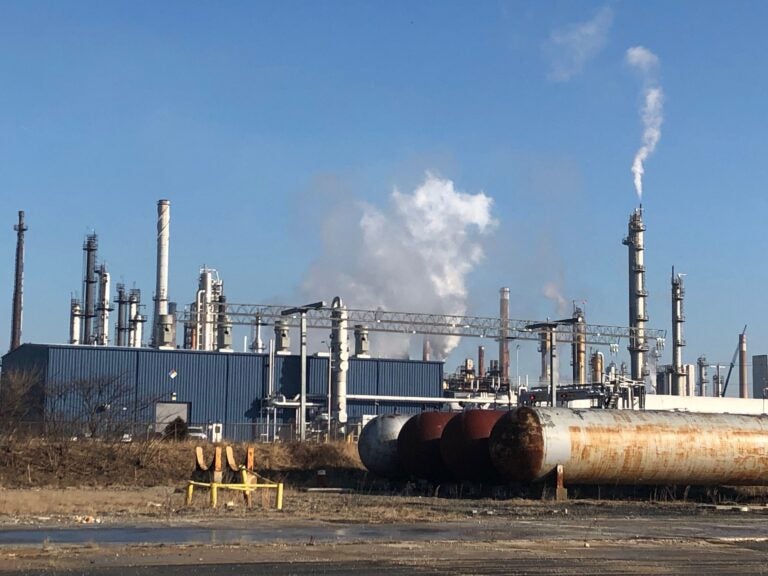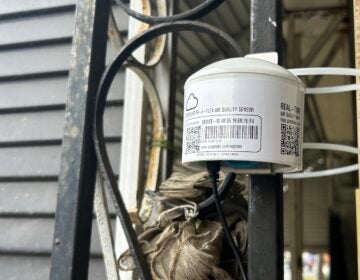‘Boiler failure’ at Delaware City Refinery releases toxic air pollutants
The air pollutant sulfur dioxide can make breathing harder for people with asthma. The refinery has been releasing it for several days.

File - The Delaware City Refinery seen in 2024. (Cris Barrish/WHYY)
This story is part of the WHYY News Climate Desk, bringing you news and solutions for our changing region.
From the Poconos to the Jersey Shore to the mouth of the Delaware Bay, what do you want to know about climate change? What would you like us to cover? Get in touch.
A hazardous air pollutant has been leaking from the Delaware City Refinery for several days.
Early Monday morning, an alert sent through Delaware’s Environmental Release Notification System described a “mechanical issue” that started late Sunday night, causing the release of several chemicals into the air, including carbon monoxide, ammonia, hydrogen sulfide, sulfur dioxide and hydrogen cyanide, noted as “HCN.” The report said repairs “were being made.”
A similar report the next day described the incident as a “boiler issue” that caused a larger release of sulfur dioxide, and repeated that “repairs are being made to the boiler.”
By mid-week, the issue had apparently worsened, with a report Wednesday morning describing a “boiler failure” and a release of sulfur dioxide at a rate of 500 pounds per hour. The release of sulfur dioxide grew to a rate of 1,450 pounds per hour by Thursday morning, according to the notification system.
“The release will continue until repairs are made,” Thursday’s notification read.
Sulfur dioxide can be life-threatening when breathed in at very high concentrations, according to the U.S. Centers for Disease Control and Prevention. At lower concentrations, it can cause irritation, coughing and breathing difficulties, particularly for people with lung conditions like asthma. Sulfur dioxide can also react with other compounds in the air to create small particles that exacerbate lung conditions and can trigger heart attacks for people with cardiovascular disease. Sulfur dioxide also contributes to the formation of acid rain in the atmosphere.
The reports in Delaware’s Environmental Release Notification System mark the release as “extremely hazardous,” and say the chemical “may cause death or permanent injury after very short exposure to small quantities.”
The reports do not specify whether workers or people living or working near the site could be exposed. They indicate that the public was notified, but that no precautions were recommended.
Several of the chemicals released Sunday night can be dangerous at high levels, said Peter DeCarlo, a professor of environmental health and engineering professor at Johns Hopkins University. Refinery workers should take safety precautions when working around the site of the release, he said, and people in the community surrounding the refinery should avoid being downwind if they can.
“If you don’t have to be downwind, don’t be downwind,” he said. “It’s just the general precaution thing I would take.”
Based on the amounts reported in the release notifications, the sulfur dioxide that’s being released could potentially cause irritation for some people downwind, DeCarlo said.
“People who are sensitive are going to feel that in their lungs,” he said.
In response to questions about whether the release poses a health risk to refinery workers or people outside the refinery site, Delaware Department of Natural Resources and Environmental Control spokesperson Michael Globetti pointed WHYY News back to the Environmental Release Notification System.
The chemical release at the Delaware City Refinery comes after President Donald Trump’s administration terminated a grant that would have paid for a community air monitoring program near the refinery, run by the nonprofit Clean Air Council.
The biggest source of sulfur dioxide in the atmosphere is the burning of fossil fuels at industrial facilities such as power plants, according to the U.S. Environmental Protection Agency.
The Delaware City Refinery has been cited in the past for unpermitted releases of sulfur dioxide, including while flaring.
PBF Energy, the company that owns the Delaware City Refinery, did not immediately respond to a request for comment.

Get daily updates from WHYY News!
WHYY is your source for fact-based, in-depth journalism and information. As a nonprofit organization, we rely on financial support from readers like you. Please give today.






